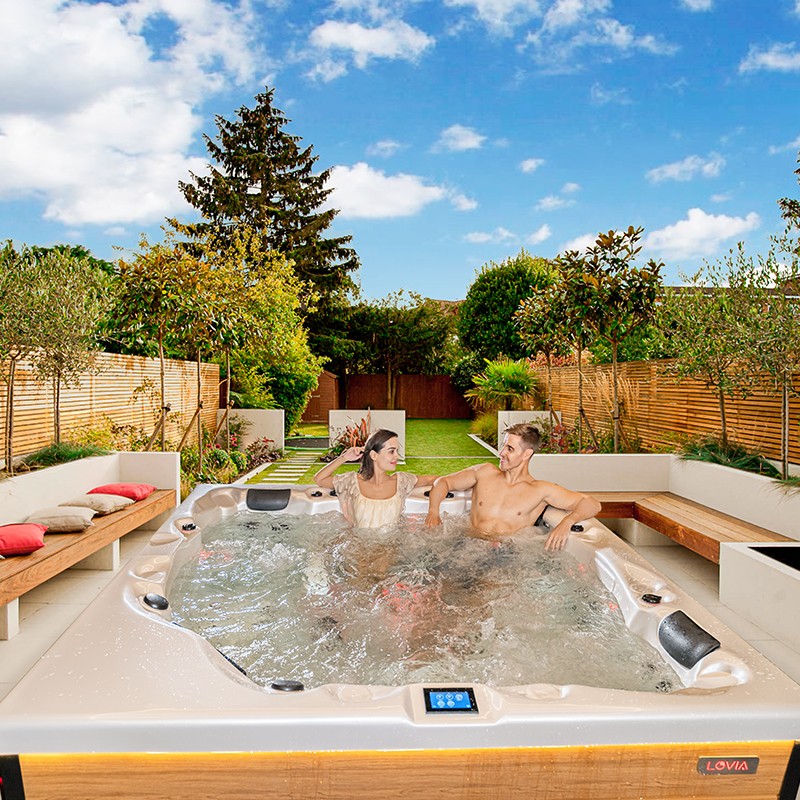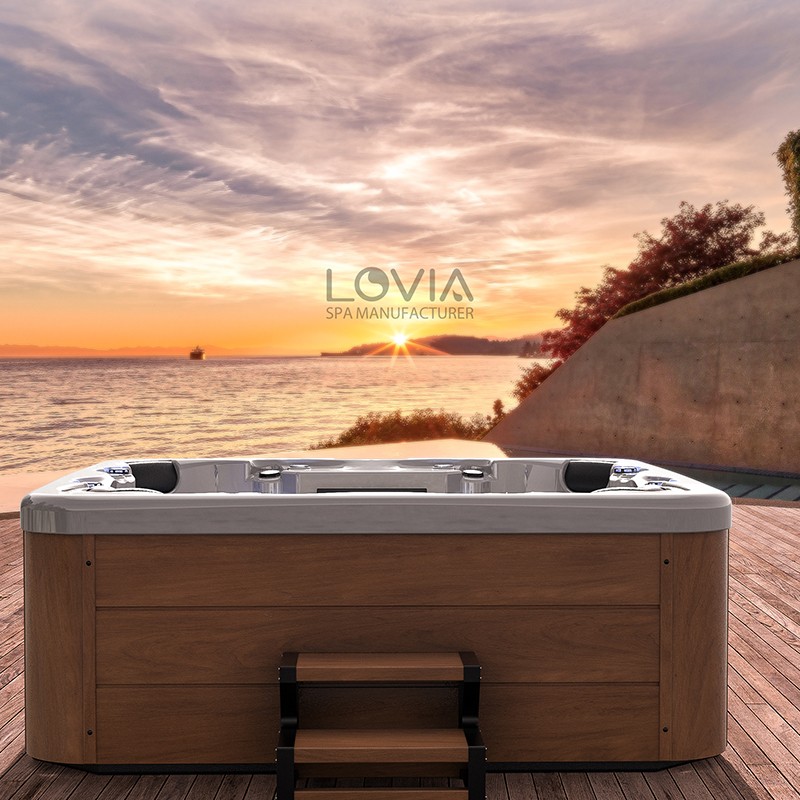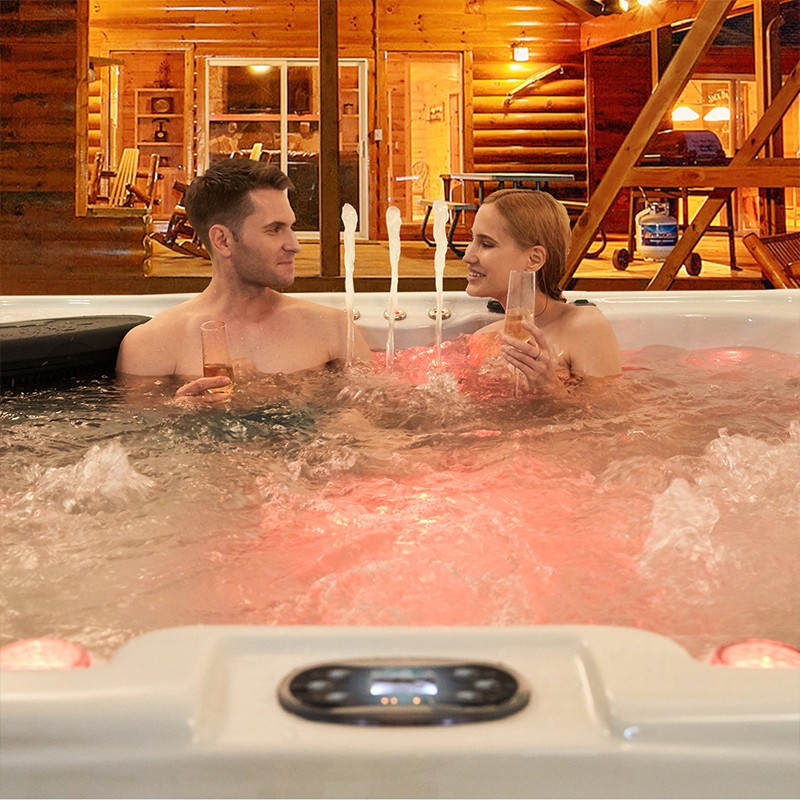
Hot Tub vs. Sauna: Which is Better for Your Health Needs?
2024-11-20 15:35In the modern trend of health and wellness, hot bathtubs and saunas have become common facilities in homes and gyms. Both of them not only provide physical relaxation and psychological relief, but also bring a variety of health benefits. However, faced with these two different ways of relaxation, many people are confused when choosing.
This article will help you understand which one is better for your needs by detailing the characteristics of hot water tubs and saunas, the ideal use temperature, and the health benefits of each.

What is a hot tub?
A hot bathtub, also known as a jacuzzi, is a device that provides massage and relaxation effects through water flow and hot water. Modern hot bathtubs are usually equipped with multiple jets that can produce strong water flow and bubbles to massage various parts of the body. Hot tubs are not only suitable for home use, but are also widely used in spas and resorts.
The Merriam-Webster Dictionary defines a hot water tub (also known as a spa) as "a large vat of hot water in which bathers soak and usually socialize." While hot tubs are certainly a great place to soak and socialize, there are many other cited health benefits besides enjoyment. For example, Jonathan B. Smith, professor of health and physical education at Indiana University of Pennsylvania, in collaboration with the National Swimming Pool Foundation®, conducted a study titled "Hot Water and Healthy Living: The Science of Hot Water Soaking: How It Promotes a Healthy Body, Mind, and Lifestyle" that explored the power of warm water soaking and its health benefits—including healing, heart health, relaxation, and even mental health.
Function and Design:
Hot tubs are equipped with multiple jets that can adjust the intensity and direction of the water flow to provide different types of massage effects. Hot tubs have built-in heating systems that can control the water temperature within a certain range, ensuring that users enjoy a massage at a comfortable temperature.
Most modern hot tubs are equipped with digital control panels that allow users to easily adjust the water temperature, jet intensity, and massage mode.
Health Benefits:
The hot water and massage jets in a hot bathtub can effectively relax tense muscles and relieve muscle pain and stiffness. : The hot water in a hot tub helps dilate blood vessels, promote blood circulation, and increase the body's metabolic rate. Soaking in hot water can help relax the body and mind and relieve stress and anxiety in daily life.
In an article on the Cleveland Clinic website titled "Benefits of Hot Tubs," Irina Todorov, MD, an integrative medicine physician, shares her thoughts on the heart-health benefits of using a hot tub. In the article, she says, "Hot tubs do not replace the need for a heart-healthy diet and regular exercise... However, using a hot tub may be beneficial to your heart health in addition to these measures."
What is the ideal temperature for a hot tub?
The ideal temperature for a hot bathtub is typically between 37°C and 40°C, a range that provides a comfortable soaking experience without causing excessive stress on the body. The U.S. Consumer Product Safety Commission states that hot tub water temperatures should not exceed 104 degrees Fahrenheit. "For healthy adults, a temperature of 38 degrees is considered safe," the source added. "However, the ideal water temperature may vary depending on individual tolerance and health conditions."
Temperature setting recommendations:
For first-time hot water tub users, it is recommended to set the water temperature to around 37°C to avoid discomfort caused by excessively high water temperatures." In cold weather, the water temperature can be appropriately increased to 40°C to provide a stronger warming and relaxing effect. People with heart disease, high blood pressure or other health problems should consult a doctor's advice when using a hot tub and choose a temperature that suits them.
Safety precautions:
High water temperature may cause dehydration, dizziness and other problems. It is recommended to soak for no more than 20 minutes each time. Pay attention to replenishing water before and after using a hot tub to avoid dehydration caused by high temperature.

What is a sauna?
A sauna is a facility that promotes sweating and relaxation through high-temperature steam or dry heat. Saunas can be divided into two types: traditional dry saunas and steam saunas. The former uses hot and dry air, while the latter uses hot and humid steam.
The Oxford Languages website defines a sauna as "a small room used as a hot air or steam bath for cleansing and refreshing the body." Sauna is an activity that has a history of thousands of years in Finnish tradition, mainly for fun and relaxation. An article titled "The Benefits of Sauna Bathing for Heart Health" on the UCLA Health website states the positive effects of sauna bathing on the heart. The article states: "Sitting in a sauna may be particularly good for your heart. The heat raises your skin temperature and causes you to sweat profusely—a short stay in a sauna can produce a pint of sweat."
Types of Saunas:
Dry saunas are usually built of wood and can reach interior temperatures of 70°C to 100°C. Lava rocks placed on the heaters heat and keep the air dry. Steam saunas use steam generators to produce high-temperature steam. The humidity is high and the temperature is usually between 40°C and 50°C.
Health Benefits:
Saunas can help the body eliminate toxins and waste products and cleanse the skin by promoting sweating. The high temperature environment of a sauna helps dilate blood vessels, increasing blood output from the heart and improving cardiovascular health. The high temperature of a sauna can relax muscles and joints, relieving joint pain and stiffness.
According to U.S. News & World Report, In the article “The Surprising Benefits of Sauna Therapy” on the website of the American College of Hematology and Public Health, regular sauna use can help reduce stress levels, in addition to similar benefits outlined in other reports mentioned earlier in this article, including pain relief, improved cardiovascular health, lowered blood pressure, and general relaxation.
Article author Vanessa Caceres added, “Researchers continue to study the potential of sauna bathing to help reduce the incidence of colds, fight depression, and possibly even prevent dementia and Alzheimer’s disease.”

What is the ideal temperature for a sauna?
The ideal temperature for a sauna varies depending on the type. Dry saunas are usually between 70°C and 100°C, while steam saunas are between 40°C and 50°C. According to the North American Sauna Association, there are 2 different types of saunas – dry saunas and steam baths/steam saunas. The ideal temperature varies for each method. For example, the website states: "To guarantee the relaxing effect of a [dry sauna] sauna, the temperature must be at least 80°C, measured where the sauna bather is sitting."
Hot Tubs vs. Saunas - Which is Better for Different Needs?
Hot tubs and saunas each have their own unique benefits and applications, and it is important to choose the relaxation method that suits your needs and health goals.
Relaxation and Stress Relief:
The warm water flow and massage function of a hot water tub are perfect for relaxing muscles and relieving stress. For those who want to relax quickly after a busy day at work, a hot tub is an ideal choice.
The high temperature environment of a sauna helps to relax the whole body, releasing stress and toxins through sweating. For those who like to achieve deep relaxation through high temperatures, a sauna is a good choice.
Muscle and Joint Pain:
The massage jets of a hot tub can provide targeted massage, which is particularly suitable for relieving muscle and joint pain in specific areas. For athletes or people with chronic pain, hot bathtubs can provide effective relief.
The high temperature of a sauna can help relax muscles and joints throughout the body, relieving pain and stiffness. For those with arthritis or other joint problems, a sauna can be a good choice. For people with chronic diseases, saunas can provide comprehensive pain relief.
Skin Health and Detoxification:
A hot bathtub can improve the health and radiance of the skin by promoting blood circulation. The warm water and massage jets can also help cleanse the skin and remove dirt and dead skin cells.
A sauna can significantly improve skin health by removing toxins and waste from the body through heavy sweating. The high temperature of the sauna can also open the pores and deeply cleanse the skin.
Cardiovascular Health:
The warm environment of a hot water tub can help dilate blood vessels and improve blood circulation, which has certain benefits for cardiovascular health. However, the high temperature water environment may not be suitable for people with heart disease, so you need to consult a doctor before use.
Saunas increase heart rate and blood circulation through the high temperature environment, which has a positive effect on cardiovascular health. Studies have shown that regular use of saunas can reduce the risk of heart disease and stroke.
Year-round Use:
Hot tubs can be used all year round, regardless of season and weather. Whether it is a cold winter or a hot summer, you can enjoy a warm spa experience.
The use of saunas is mainly limited to indoor environments, usually installed in homes or gyms, and can be used all year round. But in hot weather, using a sauna may increase discomfort.

